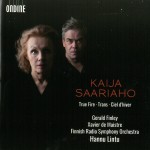Kaija Saariaho – True Fire; Trans; Ciel d’hiver
Gerald Finley; Xavier de Maistre; Finnish RSO; Hannu Lintu
Ondine ODE 1309-2 (naxosdirect.com)
Sturm
Ensemble Musikfabrik
Wergo Edition Musikfabrik 15 (musikfabrik.eu/en)
 Kaija Saariaho appears to engage all the senses at full throttle when she is writing music. This tactility is channelled in such a manner that one might conceivably hear the creeping of the shadow of a tree elongating at dusk or a flower weeping in the rain in long inventions and subtly sculpted lines for a cello. All of this appears to make for works that comprise highly complex sound masses, created out of microscopic tangles of intertwined instrumental lines – a kind of musical spider’s web woven with micropolyphony. Through it all she remains completely focused on melody, counterpoint and harmony, with rhythm also surfacing in dramatic outbursts. Saariaho appears to push form to its limit, creating a compelling musical world at once eerie and beautiful.
Kaija Saariaho appears to engage all the senses at full throttle when she is writing music. This tactility is channelled in such a manner that one might conceivably hear the creeping of the shadow of a tree elongating at dusk or a flower weeping in the rain in long inventions and subtly sculpted lines for a cello. All of this appears to make for works that comprise highly complex sound masses, created out of microscopic tangles of intertwined instrumental lines – a kind of musical spider’s web woven with micropolyphony. Through it all she remains completely focused on melody, counterpoint and harmony, with rhythm also surfacing in dramatic outbursts. Saariaho appears to push form to its limit, creating a compelling musical world at once eerie and beautiful.
The music on this disc is made up of three exquisite orchestral works and is beyond tonality, atonality and post-modernization. On Trans, a work in three movements for harp and orchestra, Saariaho creates a vivid storyline and invites the listener to follow her principal character – personified by the harp – as it evolves in the music’s narrative. Harpist Xavier de Maistre’s performance is lustrous and the Finnish Radio Symphony Orchestra is outstanding as they make the work seem visionary, highlighting Saariaho’s gift for creating hauntingly memorable sounds.
Saariaho also reveals her heightened sense of the dramatic in Ciel d’hiver, a retelling of part of the journey of the son of Poseidon, re-orchestrated from her larger piece, Orion. The appropriately smaller symphony orchestra still manages to deliver the work’s supple textures with consummate musicality, allowing for the beauty of the mythic narrative to emerge with compelling force. On True Fire, Saariaho turns to perhaps her greatest strength – the setting of poetry to music. This work is performed by the great Canadian baritone Gerald Finley, who weathers the enormous difficulty of the vocal writing with glorious ease. His vocal outpourings, together with masterful orchestral direction by Hannu Lintu, help the poetry leap off the page.
 Saariaho’s music reappears on a second disc also featuring works by two other contemporary composers, Steffen Schleiermacher and Michael Wertmüller. The disc is titled Sturm (or Storm) as the music is evocative of – poetically or otherwise – atmospheric agitation appropriately conjured up by the extraordinary contemporary collective, Ensemble Musikfabrik, joined throughout by soloing guest musicians.
Saariaho’s music reappears on a second disc also featuring works by two other contemporary composers, Steffen Schleiermacher and Michael Wertmüller. The disc is titled Sturm (or Storm) as the music is evocative of – poetically or otherwise – atmospheric agitation appropriately conjured up by the extraordinary contemporary collective, Ensemble Musikfabrik, joined throughout by soloing guest musicians.
In the case of Saariaho’s contribution, the music translates parts of Shakespeare (The Tempest) reincarnated in a cycle of songs titled The Tempest Songbook and brought to life by the lustrous soprano of Olivia Vermeulen and the ink-dark baritone of Peter Schöne. Schleiermacher’s Das Tosen Des Staunenden Echos (The roar of the amazed echo) captures an agitated journey, its turbulent repeated gestures revolving theatrically, breaking in waves and sounding like fluid birth pangs in the very act of the enigmatic composition itself. Wertmüller’s Antagonisme Contrôlé is a fiery piece that roars between the freewheeling worlds of jazz and avant-garde-music styles as soloists, including the inimitable saxophonist Peter Brötzmann, take the music to dizzying heights.



